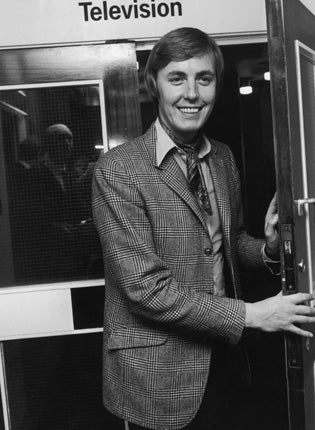Simon Dee, the star of the 60s who fell to Earth, dies aged 74
His shows attracted audiences of 18 million, his guests were the cream of entertainment. But fame proved to be a fickle thing ...

Simon Dee, the Jaguar-driving playboy and DJ who became Britain's first chat-show host, but whose rise and fall as a household name in the 1960s became a by-word for the fickle nature of celebrity, died yesterday from cancer. He was 74.
As the presenter of the BBC's Dee Time, the famously suave broadcaster drew audiences of up to 18 million for his interviews with guests including Sammy Davis Jnr and John Lennon.
With his sculpted fringe, penchant for cravats and smooth repartee, Dee became the epitome of the Swinging Sixties, pushing back cultural boundaries and rubbing shoulders with the stars of the day, from The Beatles to Charlton Heston.
As the embodiment of Sixties grooviness, he was once said by Liz Hurley to have been the inspiration for the film character Austin Powers.
But Dee's rapid ascent, which saw him move from being the DJ whose voice was the first heard on the floating pirate station Radio Caroline in 1964 to become one of Britain's highest-paid broadcasters, was matched only by the speed of his disappearance from the nation's screens.
After a series of contractual disputes, his shows were dropped by 1970 and, unable to revive his showbiz career, he found a job as a bus driver.
Dee, whose real name was Nicholas Henty-Dodd, was diagnosed with untreatable bone cancer in recent weeks and was admitted to the Royal Hampshire County Hospital, near his home in Winchester.
His daughter, Domino Henty-Dodd, said: "It happened very, very quickly. He was dearly loved by his family."
With its closing credits featuring Dee driving away in an E-Type Jaguar in the company of a glamorous blonde, Dee Time caught the spirit of an era. In its 1967 heyday, the twice-weekly show's groundbreaking format of music and set-piece interviews – as well as its catchphrase of "It's Siiiiimon Dee!" – secured huge audiences for the BBC and placed its host at the heart of London's heady social scene.
The star would often be seen being driven along the King's Road by his secretary in his Aston Martin; his fame won him cameo roles in the films The Italian Job and Doctor in Trouble.
After his stint with Radio Caroline, based in a converted Danish ferry moored off the Essex coast, Dee was persuaded to join the launch presenting team for Radio 1. He went on to compere the Miss World contest, as well as appearing on Top of the Pops and Juke Box Jury.
His daughter Domino said yesterday: "Before celebrity became such an everyday thing, he was a celebrity in the real sense. He was one of the first to become famously so quickly."
Perhaps slightly in thrall to his own fame, Dee, who had served as an RAF photographer, in 1969 approached his BBC boss, head of light entertainment Sir Bill Cotton, for a pay rise. Sir Bill instead offered him a 20 per cent pay cut "to test his loyalty" to the BBC. Dee promptly took his services to the independent channel LWT on a two-year contract worth £100,000.
But friction with David Frost, the channel's part-owner and star attraction, led to Dee's show being dropped. Such was Dee's fame and debonair manner that the public school-educated star was reputedly considered as a successor to Sean Connery as James Bond.
Ironically, it was another James Bond who put paid to his career at LWT. A bizarre interview with Bond actor George Lazenby, during which Lazenby named the politicians he considered responsible for the assassination of US President Kennedy, was cited as the reason for the cancellation of Dee's show. Frozen out of showbiz, Dee famously signed on at the Fulham labour exchange and rapidly sank from public view, taking a job as a bus driver and falling into debt.
Dee spent brief periods in prison for minor offences, and at the time of his illness was living in a one-bedroom flat in Winchester. In a 1987 interview, he said of the decade that was his heydey: "One was very much in touch with this flow [of creativity], which ended when the Sixties ended. As I did."
Join our commenting forum
Join thought-provoking conversations, follow other Independent readers and see their replies
Comments